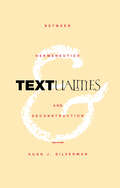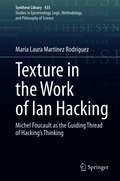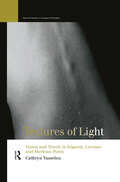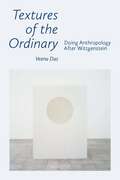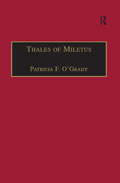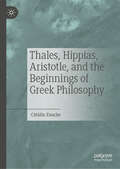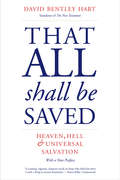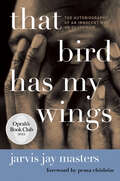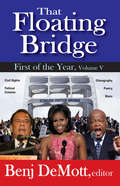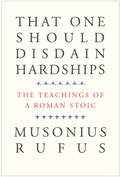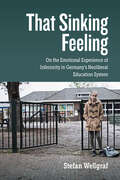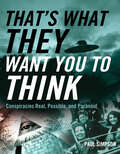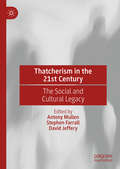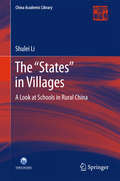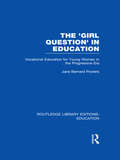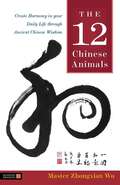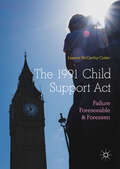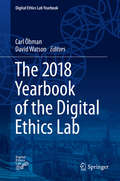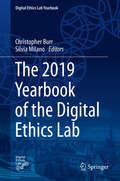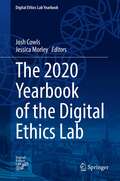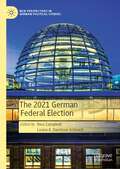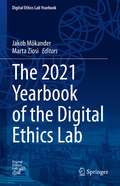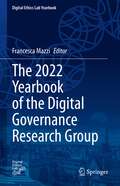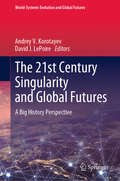- Table View
- List View
Textualities: Between Hermeneutics and Deconstruction
by Hugh J. SilvermanFirst published in 1994. Routledge is an imprint of Taylor & Francis, an informa company.
Texture in the Work of Ian Hacking: Michel Foucault as the Guiding Thread of Hacking’s Thinking (Synthese Library #435)
by María Laura Martínez RodríguezThis book offers a systematized overview of Ian Hacking's work. It presents Hacking’s oeuvre as a network made up of four interconnected key nodes: styles of scientific thinking & doing, probability, making up people, and experimentation and scientific realism.Its central claim is that Michel Foucault’s influence is the underlying thread that runs across the Canadian philosopher’s oeuvre. Foucault’s imprint on Hacking’s work is usually mentioned in relation to styles of scientific reasoning and the human sciences. This research shows that Foucault’s influence can in fact be extended beyond these fields, insofar the underlying interest to the whole corpus of Hacking’s works, namely the analysis of conditions of possibility, is stimulated by the work of the French philosopher.Displacing scientific realism as the central focus of Ian Hacking’s oeuvre opens up a very different landscape, showing, behind the apparent dispersion of his works, the far-reaching interest that amalgamates them: to reveal the historical and situated conditions of possibility for the emergence of scientific objects and concepts.This book shows how Hacking’s deployment concepts such as looping effect, making up people, and interactive kinds, can complement Foucauldian analyses, offering an overarching perspective that can provide a better explanation of the objects of the human sciences and their behaviors.
Textures of Light: Vision and Touch in Irigaray, Levinas and Merleau Ponty (Warwick Studies in European Philosophy)
by Cathryn VasseleuTextures of Light draws on the work of Luce Irigaray, Maurice Merleau-Ponty and Emmanuel Levinas to present an outstanding and ground breaking study of the vital importance of light in Western thought. Since Plato's allegory of the cave, light and the role of sight have been accorded a unique position in Western thought. They have stood as a metaphor for truth and objectivity and the very axis of modern rationalism. More recently however, this status has come under significant criticism from continental and feminist thought which has stressed the privileging of subjectivity and masculinity in such a metaphor.
Textures of the Ordinary: Doing Anthropology after Wittgenstein (Thinking from Elsewhere)
by Veena DasHow might we speak of human life amid violence, deprivation, or disease so intrusive as to put the idea of the human into question? How can scholarship and advocacy address new forms of war or the slow, corrosive violence that belie democracy's promise to mitigate human suffering? To Veena Das, the answers to these question lie not in foundational ideas about human nature but in a close attention to the diverse ways in which the natural and the social mutually absorb each other on a daily basis. Textures of the Ordinary shows how anthropology finds a companionship with philosophy in the exploration of everyday life. Based on two decades of ethnographic work among low-income urban families in India, Das shows how the notion of texture aligns ethnography with the anthropological tone in Wittgenstein and Cavell, as well as in literary texts. Das shows that doing anthropology after Wittgenstein does not consist in taking over a new set of terms such as forms of life, language games, or private language from Wittgenstein’s philosophy. Instead, we must learn to see what eludes us in the everyday precisely because it is before our eyes. The book shows different routes of return to the everyday as it is corroded not only by catastrophic events but also by repetitive and routine violence within everyday life itself. As an alternative to normative ethics, this book develops ordinary ethics as attentiveness to the other and as the ability of small acts of care to stand up to horrific violence.Textures of the Ordinary offers a model of thinking in which concepts and experience are shown to be mutually vulnerable. With questions returned to repeatedly throughout the text and over a lifetime, this book is an intellectually intimate invitation into the ordinary, that which is most simple yet most difficult to perceive in our lives.
Thales of Miletus: The Beginnings of Western Science and Philosophy (Western Philosophy Series)
by Patricia F. O'Grady'What is the basic building block of the universe?' Thales of Miletus was the first to ask this fundamental, yet to be answered, question in the sixth century B.C. This book offers an in-depth account of the answers he gave and of his adventure into many areas of learning: philosophy, science, mathematics and astronomy. Thales proved that the events of nature were comprehensible to man and could be explained without the intervention of mythological beings. Henceforth they became subject to investigation, experiment, questioning and discussion. Presenting for the first time in the English language a comprehensive study of Thales of Miletus, Patricia O'Grady brings Thales out of pre-Socratic shadows into historical illumination and explores why this historical figure has proved to be of lasting significance.
Thales, Hippias, Aristotle, and the Beginnings of Greek Philosophy
by Cătălin EnacheThis book challenges the current consensus about Aristotle&’s sources in his account of Thales and the origin of philosophy (Metaphysics A, 983b20– 984a3). The current view is that Aristotle found his information about Thales&’ philosophy in an important book by the sophist Hippias. There is a widespread consensus among scholars that Hippias, in this lost treatise, dealt not only with Thales but with many other Presocratic philosophers, thus significantly contributing to the preservation of Presocratic ideas. This book investigates the alleged connection between Hippias and Aristotle&’s account of Thales. It contends that we have no reason to posit any such connection because there is no evidence whatsoever that Aristotle, who never mentions Hippias in his extant work, used any book by the sophist. Thales, Hippias, Aristotle, and the Beginnings of Greek Philosophy is essential reading for all scholars of classical antiquity interested in the beginnings of Greek philosophy.
That All Shall Be Saved: Heaven, Hell, and Universal Salvation
by David Bentley HartA stunning reexamination of one of the essential tenets of Christian belief from one of the most provocative and admired writers on religion today The great fourth‑century church father Basil of Caesarea once observed that, in his time, most Christians believed that hell was not everlasting, and that all would eventually attain salvation. But today, this view is no longer prevalent within Christian communities. In this momentous book, David Bentley Hart makes the case that nearly two millennia of dogmatic tradition have misled readers on the crucial matter of universal salvation. On the basis of the earliest Christian writings, theological tradition, scripture, and logic, Hart argues that if God is the good creator of all, he is the savior of all, without fail. And if he is not the savior of all, the Kingdom is only a dream, and creation something considerably worse than a nightmare. But it is not so. There is no such thing as eternal damnation; all will be saved. With great rhetorical power, wit, and emotional range, Hart offers a new perspective on one of Christianity’s most important themes.
That Bird Has My Wings: The Autobiography of an Innocent Man on Death Row
by Jarvis Jay MastersJarvis Jay Masters has taken an extraordinary journey of faith. Strangely enough, his moment of enlightenment came behind the bars of San Quentin's death row. <p><p>In this compelling memoir, inmate and author Jarvis Jay Masters takes us from the arms of his heroin-addicted mother to an abusive foster home, on his escape to the illusory freedom of the streets and through lonely nights spent in bus stations and juvenile homes, and finally to life inside the walls of San Quentin State Prison. Using the nub and filler from a ballpoint pen (the only writing instrument allowed him in solitary confinement), Masters chronicles the story of a bright boy who turns to a life of crime, and of a penitent man who embraces Buddhism to find hope in this ultimately inspirational story. <p><p> Masters has written his remarkable story as a cautionary tale for anyone who might be tempted to follow in his footsteps, and as a plea for under-standing to a world that too often ignores the plight of the forgotten members of society. His personal story dramatically reminds us all that freedom and opportunity are not to be taken for granted, and that no matter what their neighborhood, no matter what their race, every child matters. <p> <b>New York Times Bestseller</b>
That Floating Bridge
by Benj DeMottAlive to history in the making (and the weight of the past) this volume examines Obama's presidency and Lyndon Johnson's, the killing of Trayvon Martin and the death of Andrew Breitbart, Occupy Wall Street and "America Beyond Capitalism." It presents essays, poems, and plays that speak to our times and challenge the liberal imagination. The title, That Floating Bridge, evokes Representative John Lewis' line "Obama is what comes at the end of that bridge in Selma" as it quotes a track on Gregg Allman's Low Country Blues, which Scott Spencer lauds here in a review for the Ages.That Floating Bridge's peerless range of contributors includes Amiri Baraka, Gar Alperovitz, Bernard Avishai, Uri Avnery, Bill Ayers, Paul Berman, John Chernoff, Mark Dudzic, Carmelita Estrellita, Henry Farrell, Fr. Rick Frechette, Donna Gaines, David Golding, Eugene Goodheart, Lawrence Goodwyn, Lisa Guenther, Alec Harrington, Malcolm Harris, Casey Hayden, Christopher Hayes, Patterson Hood, Roxane Johnson, Ben Kessler, Bob Levin, Philip Levine, Bongani Madondo, Greil Marcus, Scott McLemee, Judy Oppenheimer, Jedediah Purdy, Nick Salvatore, Aram Saroyan, Tom Smucker, Fredric Smoler, Violet Socks, A. B. Spellman, Scott Spencer, Richard Torres, Jesmyn Ward, and Pablo Yglesias.An account of how Franz Boas "did more to combat race prejudice than any other person" anchorsone section, but the volume also addresses devolutions of "diversity" linked with careerism in the art world and academe. An un-scholastic section titled "Criticism of Life"celebrates older and younger critics/poets. Songs are key to this volume's good times. Music writing ranging from Eddie Hinton's Very Extremely Dangerous to Berlioz's Romeo and Juliet enhances the pleasures of this text.
That One Should Disdain Hardships: The Teachings of a Roman Stoic
by Musonius RufusPerennial wisdom from one of history&’s most important Stoic teachers The Stoic philosopher Musonius Rufus was one of the most influential teachers of his era, imperial Rome, and his message still resonates with startling clarity today. Alongside Stoics like Seneca, Epictetus, and Marcus Aurelius, he emphasized ethics in action, displayed in all aspects of life. Merely learning philosophical doctrine and listening to lectures, they believed, will not do one any good unless one manages to interiorize the teachings and apply them to daily life. In Musonius Rufus&’s words, &“Philosophy is nothing else than to search out by reason what is right and proper and by deeds to put it into practice.&” At a time of renewed interest in Stoicism, this collection of Musonius Rufus&’s lectures and sayings, beautifully translated by Cora E. Lutz and introduced by Gretchen Reydams-Schils, offers readers access to the thought of one of history&’s most influential and remarkable Stoic thinkers.
That Option No Longer Exists: Britain 1974-76
by John MedhurstIt is time to look afresh at the 1970s. It was not a grey decade of decline, defeat and power blackouts. Bursting with cultural experimentation, sexual liberation and industrial militancy, the 1970s saw the ruling elites of Britain challenged at every level, most especially by a Labour left led by Tony Benn which aimed to effect a "fundamental and irreversible shift in the balance of wealth and power in favour of working people". That Option No Longer Exists reveals a hidden history - how Benn and the left tried to reform British industry, to introduce democracy in the workplace and overturn the power of Finance; and how Whitehall, the security services and the City fought back, paving the way for Thatcher to re-establish the rule of money and the markets. Britain almost took a different path in 1974-76 to that of massive wealth inequality, the dominance of the City, and the slow death of the welfare state. This is the story of a struggle within government almost forgotten, and of a tragic turning point in British history.
That Sinking Feeling: On the Emotional Experience of Inferiority in Germany's Neoliberal Education System
by Stefan WellgrafEmotions, especially those of impoverished migrant families, have long been underrepresented in German social and cultural studies. That Sinking Feeling raises the visibility of the emotional dimensions of exclusion processes and locates students in current social transformations. Drawing from a year of ethnographic fieldwork with grade ten students, Stefan Wellgraf’s study on an array of both classic emotions and affectively charged phenomena reveals a culture of devaluation and self-assertion of the youthful, post-migrant urban underclass in neoliberal times.
That's What They Want You to Think: Conspiracies Real, Possible, and Paranoid
by Paul SimpsonAn analysis of twenty-nine of the most famous theories, featuring assassinations, military operations, aliens, secret societies, and government conspiracies.Conspiracies. They happen every day. All it takes is a couple of people and a secret, nefarious plan. But then there are big conspiracy theories—the assassinations, cover-ups, and shadow governments that are endlessly debated on talk radio and the Internet. Are they real? Are they even possible? Or are they just plain paranoid?Paul Simpson has researched a wide variety of conspiracies, from those historically accepted to those that spark accusations of “being a part of it” if you disagree with their supporters. In reviewing these famous (and, in some cases, infamous) theories, That’s What They Want You to Think does not start from the position of a believer or a debunker. In each case, Simpson makes up his own mind based on the evidence of primary documents—and some of his conclusions may surprise even the most dedicated conspiracy researcher.Straightforward and engaging, That’s What They Want You to Think provides food for thought for both conspiracy buffs and skeptics. Novices and veteran researchers alike will debate the latest evidence and fresh takes on long-standing theories. Covering topics as diverse as the JFK assassination and faked moon landings, from the bombing of Pearl Harbor to Area 51 and the New World Order, Simpson makes you wonder if what you believe is real, possible, or paranoid.Praise for That’s What They Want You to Think“This lively book looks at a variety of conspiracy theories—many well-known, others not so much—from a historical, investigative point of view. . . . Well worthwhile.” —Booklist
Thatcherism in the 21st Century: The Social and Cultural Legacy
by Stephen Farrall David Jeffery Antony MullenThis collection examines the social and cultural legacy of Thatcherism in the 21st century. Drawing upon perspectives from a range of disciplines, it considers how Thatcherism manifests itself today and how we can assess its long-term impact. The book is divided into four sections, which offer different ways of conceptualising and addressing questions of legacy: the ideological impact of Thatcherism on the Conservative Party and on the country; the long-term impact of Thatcherism across different parts of the UK; how Thatcherism has altered social attitudes to everything from welfare spending to Europe; and how popular historical accounts of Thatcherism have become embedded in different parts of contemporary British culture. The essays in this volume draw upon newly available archival materials, oral histories, social attitudes surveys and parliamentary debates to provide a well-rounded perspective on Thatcherism today.
The "States" in Villages
by Shulei LiThis book presents a study in educational sociology, exploring the function of rural schools, which are a symbol of the state in rural society, in a time characterized by local cultural transition. The book begins with an investigation of the status quo, background and history of a representative rural school, Fengning Hope Elementary School, and gives a definition of "the 'states' in villages. " Subsequently, on the basis of research on the teachers, an analysis of the courses taught, and comparison to other rural elementary schools of the same type, it reveals the dual status of rural schools and their relation with social development in rural areas. Based on thorough fieldwork and empirical research, the book provides a new vision of the interactive relation between the state and rural society, particularly focusing on the role of rural education in that relation. In addition, it explores the reshaping of Chinese culture and the part that intellectuals play in the process of today's cultural transition. For English-language readers and Western professionals, this translated version will offer an essential window into Chinese studies from a local point of view.
The 'Girl Question' in Education: Vocational Education for Young Women in the Progressive Era (Routledge Library Editions: Education)
by Jane Bernard-PowersThis book is a history of the genesis and development of vocational education for young women in the United States. Home economics, trade training and commercial education – the three key areas of vocational training available to young women during the progressive era – are the focus of this work. Beginning with a study of the "woman question", or what women were supposed to be, the book traces the three curriculum areas from prescription, through lively discussions of policy to the actual programs and student responses to the programs. The author tells the story of education for work from several different perspectives and draws on a vast array of sources to paint this broad canvas of vocational education for young women at the turn of the twentieth century.
The 12 Chinese Animals: Create Harmony in your Daily Life through Ancient Chinese Wisdom
by Zhongxian Wu* Silver Medal Winner in the 2010 BOTYA Awards Body, Mind and Spirit Category * The Chinese horoscope holds the key to a better understanding of self and others, and to living a life of harmony. Not just the year of birth, but also the month, day and hour have significance in true Chinese astrology. Master Zhongxian Wu explains how to find your power animal symbols, and how to learn from their wisdom. By fully understanding what each animal signifies, and how they relate to the major hexagrams of the Yijing, he shows that they can help you to find inner peace and live in harmony with family, friends, the wider community, and with nature. Using the wisdom of the twelve animal symbols as a guide, you will learn how to better understand your personality, and make choices that profoundly influence your health, relationships, career, and finances, allowing you to live up to your greatest potential. Making the wisdom of the twelve Chinese animals accessible to the Western reader for the first time in its relationship with the Yijing, this book will be an illuminating read for anyone interested in understanding themselves and their life patterns better, Chinese astrology, and the Yijing.
The 1991 Child Support Act: Failure Foreseeable and Foreseen
by Leanne McCarthy-CotterThis book assesses the 1991 Child Support Act and demonstrates how its failure was ‘foreseeable’ and ‘foreseen’. It provides an understanding of the creation, and failure, of the Act, as well as providing an examination of the British policy-making process. The book re-introduces the ‘stages approach’ as an appropriate framework for examining policy-making in general, and analysing policy failure in particular. It draws on evidence gained through interviews, official documents, unpublished consultation responses, Parliamentary debates, and materials from pressure groups and think-tanks, as well as academic literature. The 1991 Child Support Act is seen as one of the most controversial and notorious policy failures in Britain. However it has received relatively little academic attention. An in-depth analysis of the policy-making process that led to the development and passage of this deeply flawed policy has largely been neglected: this book fills that gap.
The 2018 Yearbook of the Digital Ethics Lab (Digital Ethics Lab Yearbook #1)
by David Watson Carl ÖhmanThis book explores a wide range of topics in digital ethics. It features 11 chapters that analyze the opportunities and the ethical challenges posed by digital innovation, delineate new approaches to solve them, and offer concrete guidance to harness the potential for good of digital technologies. The contributors are all members of the Digital Ethics Lab (the DELab), a research environment that draws on a wide range of academic traditions.The chapters highlight the inherently multidisciplinary nature of the subject, which cannot be separated from the epistemological foundations of the technologies themselves or the political implications of the requisite reforms. Coverage illustrates the importance of expert knowledge in the project of designing new reforms and political systems for the digital age. The contributions also show how this task requires a deep self-understanding of who we are as individuals and as a species.The questions raised here have ancient -- perhaps even timeless -- roots. The phenomena they address may be new. But, the contributors examine the fundamental concepts that undergird them: good and evil, justice and truth. Indeed, every epoch has its great challenges. The role of philosophy must be to redefine the meaning of these concepts in light of the particular challenges it faces. This is true also for the digital age. This book takes an important step towards redefining and re-implementing fundamental ethical concepts to this new era.
The 2019 Yearbook of the Digital Ethics Lab (Digital Ethics Lab Yearbook)
by Christopher Burr Silvia MilanoThis edited volume presents an overview of cutting-edge research areas within digital ethics as defined by the Digital Ethics Lab of the University of Oxford. It identifies new challenges and opportunities of influence in setting the research agenda in the field.The yearbook presents research on the following topics: conceptual metaphor theory, cybersecurity governance, cyber conflicts, anthropomorphism in AI, digital technologies for mental healthcare, data ethics in the asylum process, AI’s legitimacy and democratic deficit, digital afterlife industry, automatic prayer bots, foresight analysis and the future of AI. This volume appeals to students, researchers and professionals.
The 2020 Yearbook of the Digital Ethics Lab (Digital Ethics Lab Yearbook)
by Josh Cowls Jessica MorleyThis annual edited volume presents an overview of cutting-edge research areas within digital ethics as defined by the Digital Ethics Lab of the University of Oxford. It identifies new challenges and opportunities of influence in setting the research agenda in the field. The 2020 edition of the yearbook presents research on the following topics: governing digital health, visualising governance, the digital afterlife, the possibility of an AI winter, the limits of design theory in philosophy, cyberwarfare, ethics of online behaviour change, governance of AI, trust in AI, and Emotional Self-Awareness as a Digital Literacy. This book appeals to students, researchers and professionals in the field.
The 2021 German Federal Election (New Perspectives in German Political Studies)
by Ross Campbell Louise K. Davidson-SchmichThe German Federal Election of 2021 was one of the most open and competitive in the post-war era. This book provides a systematic analysis of its domestic and international context, the shifting balance of the political parties, the election strategies and campaign themes, along with the challenges of government formation. An international array of scholars from Europe, North America and Australasia have contributed specially commissioned chapters on their principal areas of research. The discussion of individual topics is combined with sufficient background information so as to be accessible to readers who may not have detailed knowledge of German politics. In addition, by including links to multimedia election-related content we enhance the value of this volume and make it an indispensable reference tool.
The 2021 Yearbook of the Digital Ethics Lab (Digital Ethics Lab Yearbook)
by Jakob Mökander Marta ZiosiThis annual edited volume explores a wide range of topics in digital ethics and governance. Included are chapters that: analyze the opportunities and ethical challenges posed by digital innovation; delineate new approaches to solve them; and offer concrete guidance on how to govern emerging technologies. The contributors are all members of the Digital Ethics Lab (the DELab) at the Oxford Internet Institute, a research environment that draws on a wide range of academic traditions. Collectively, the chapters of this book illustrate how the field of digital ethics - whether understood as an academic discipline or an area of practice - is undergoing a process of maturation. Most importantly, the focus of the discourse concerning how to design and use digital technologies is increasingly shifting from ‘soft ethics’ to ‘hard governance’. Then, there is the trend in the ongoing shift from ‘what’ to ‘how’, whereby abstract or ad-hoc approaches to AI governance are giving way to more concrete and systematic solutions. The maturation of the field of digital ethics has, as this book attempts to show, been both accelerated and illustrated by a series of recent events. This text thereby takes an important step towards defining and implementing feasible and effective approaches to digital governance. It appeals to students, researchers and professionals in the field.
The 2022 Yearbook of the Digital Governance Research Group (Digital Ethics Lab Yearbook)
by Francesca MazziThis annual edited volume presents an overview of cutting-edge research areas within digital ethics as defined by the Digital Governance Research Group of the University of Oxford. It identifies new challenges and opportunities of influence in setting the research agenda in the field.The 2022 edition of the Yearbook presents research on the following topics: autonomous weapons, cyber weapons, digital sovereignty, smart cities, artificial intelligence for the Sustainable Development Goals, vaccine passports, and sociotechnical pragmatism as an approach to technology. This text appeals to students, researchers, and professionals in the field.
The 21st Century Singularity and Global Futures: A Big History Perspective (World-Systems Evolution and Global Futures)
by Andrey V. Korotayev David J. LePoireThis book introduces a 'Big History' perspective to understand the acceleration of social, technological and economic trends towards a near-term singularity, marking a radical turning point in the evolution of our planet. It traces the emergence of accelerating innovation rates through global history and highlights major historical transformations throughout the evolution of life, humans, and civilization. The authors pursue an interdisciplinary approach, also drawing on concepts from physics and evolutionary biology, to offer potential models of the underlying mechanisms driving this acceleration, along with potential clues on how it might progress. The contributions gathered here are divided into five parts, the first of which studies historical mega-trends in relation to a variety of aspects including technology, population, energy, and information. The second part is dedicated to a variety of models that can help understand the potential mechanisms, and support extrapolation. In turn, the third part explores various potential future scenarios, along with the paths and decisions that are required. The fourth part presents philosophical perspectives on the potential deeper meaning and implications of the trend towards singularity, while the fifth and last part discusses the implications of the Search for Extraterrestrial Intelligence (SETI). Given its scope, the book will appeal to scholars from various disciplines interested in historical trends, technological change and evolutionary processes.
